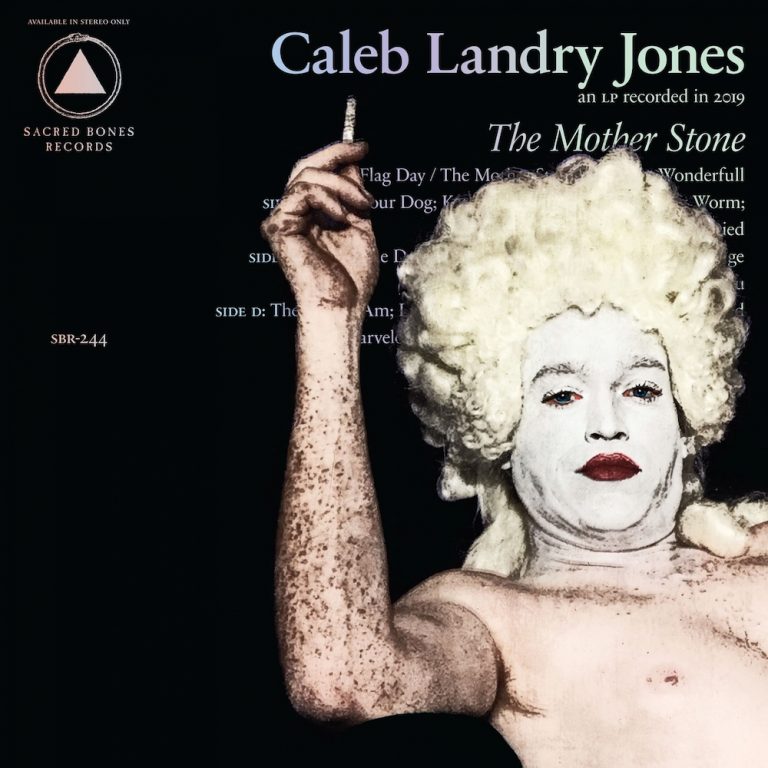To quote our very own Andy Johnston, “So the creepy-ass brother from Get Out has an album out on Sacred Bones now. Is this real life?” To Andy and anyone else bewildered by this notion—should we really be surprised by anything these days? Needless to say, Caleb Landry Jones surprises us all with his debut musical project, The Mother Stone, and proves to be much more than just that creepy ass brother from Get Out. But what isn’t surprising about Jones’ debut effort is that his music is as unnerving as his presence on screen.
From his role as Banshee in X-Men First Class to his off-kilter performances in Twin Peaks: The Return and of course Get Out, the 30-year-old Jones has carved out an image of discomfort for the better part of the past 10 years. But it was an audition for Jim Jarmusch’s 2019 film The Dead Don’t Die that commenced Jones’ evolution from side-show actor to musical mastermind behind one wacky album. All it took was one meeting with the auteur—also an established musician—to get the ball rolling on Jones’ musical career. Not only did Jones land a role in Jarmusch’s zombie comedy, but the director also connected the budding talent with some friends at Sacred Bones.
Though largely a supporting actor at this point in his career, The Mother Stone sees Jones finally take center stage, as he translates his slithering acting chops into a melodramatic display of baroque pop strangeness. This unhinged rock opera wears its influences as an unashamed mask, with Jones conjuring the eccentricities of Syd Barrett, Frank Zappa, The Beatles, and, most apparent, Mr. David Bowie.
With these luminaries in the back of Jones’ mind while making The Mother Stone, it winds up being exactly what you expect it to sound like, yet nothing you expected at once. The record opens with a grand entry in “Flag Day / The Mother Stone”, a sprawling (a word sure to be exhaustively used to describe The Mother Stone down the line) showstopper that sees Jones flaring his Bowie-esque pomposity to full effect. Containing the piano piece Jones wrote for his audition with Jarmusch, the opening cut is a whirlwind of surprises. Between the chaotic brass and piano interplay and Jones’ unruly vocal fluctuations, “Flag Day / The Mother Stone” leaves listeners in a hellscape of unease and uncertainty.
On the topic of Jones’ vocals—holy shit! Whipping back and forth between chaotic and cryptic, Jones colors his voice to a shocking degree, pinning him as a character with as much emotional depth and complexity as any performance he’s ever executed on-screen—and that’s saying a lot. From his beckoning snarl and disillusioned slurs on the song “Katya”, to the carnivorous shrieks on tracks like “You’re So Wonderful” and “No Where’s Where Nothing’s Died”, Jones pulls out all the stops to deliver listeners a show. Or maybe “circus” is a more fitting description? Yeah, that sounds about right.
While it’s easy to envision Jones as a sinister ringmaster, laughingly conducting the malaise of the world around him in “The Great I Am” and even the final two tracks “Thanks For Staying” and “Little Planet Pig”, this voyeur of violence and vitriol actually reflects on a life defined by loneliness and longing. For instance, as the doom-drenched “All I Am in You / The Big Worm” collapses into a beautiful, sputtering mess, Jones appears to sing of unrequited love, yearning for a “love like this, a love like yours.” These feelings are even more apparent in several of the song titles, as if revealing a hidden message to an individual who broke our narrator’s heart: “For The Longest Time”, “I Want To Love You”, “You’re So Wonderful”.
There are undoubtedly issues with The Mother Stone, the most glaring and insurmountable being the 68-minute length. Seriously, does any album need to be over an hour long? One could argue that a record that define’s an artist’s essence warrants such length, but Jones’ debut could have easily been cut down to eight or nine tracks to make a great album, rather than a good one. Except for a few explosive later moments, namely “No Where’s Where Nothing’s Died (A Marvelous Pain)” and “Thanks For Staying”, Jones’ musical quirks wear out their welcome halfway through the record.
With the constant shifts in tone and meandering lyrical obscurities, there is a certain unkemptness about The Mother Stone that often proves difficult to manoeuvre. While most songs flow into one another with ease, most meander far past what would be considered palatable to the “average” listener (though this is not to say that a project should be tailored specifically to listeners’ wants). Though the Texas-native has been making music for more than half his life, it seems he has yet to grasp the effectiveness of brevity. Sure, some ideas spark “wow”s and there are certainly moments of uniqueness – but brevity cannot be ignored.
For what it is, a debut record from an established actor, The Mother Stone is a stroke of real promise. With its harrowing peaks of dramatized catharsis and musical excursions that recall rock greats – yet look deep into a dark and obscure abyss – Jones’ record keeps audiences at the edges of their seats. If he can be reeled in to gather his thoughts more concisely, the sky is the limit.

